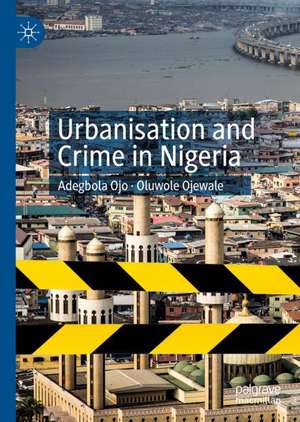Urbanisation and Crime in Nigeria
Autor Adegbola Ojo, Oluwole Ojewaleen Limba Engleză Hardback – 4 iul 2019
| Toate formatele și edițiile | Preț | Express |
|---|---|---|
| Paperback (1) | 637.28 lei 6-8 săpt. | |
| Springer International Publishing – 14 aug 2020 | 637.28 lei 6-8 săpt. | |
| Hardback (1) | 646.94 lei 6-8 săpt. | |
| Springer International Publishing – 4 iul 2019 | 646.94 lei 6-8 săpt. |
Preț: 646.94 lei
Preț vechi: 761.10 lei
-15% Nou
Puncte Express: 970
Preț estimativ în valută:
123.81€ • 127.90$ • 103.04£
123.81€ • 127.90$ • 103.04£
Carte tipărită la comandă
Livrare economică 25 martie-08 aprilie
Preluare comenzi: 021 569.72.76
Specificații
ISBN-13: 9783030197643
ISBN-10: 3030197646
Pagini: 251
Ilustrații: XXVIII, 247 p. 37 illus., 32 illus. in color.
Dimensiuni: 148 x 210 mm
Greutate: 0.6 kg
Ediția:1st ed. 2019
Editura: Springer International Publishing
Colecția Palgrave Macmillan
Locul publicării:Cham, Switzerland
ISBN-10: 3030197646
Pagini: 251
Ilustrații: XXVIII, 247 p. 37 illus., 32 illus. in color.
Dimensiuni: 148 x 210 mm
Greutate: 0.6 kg
Ediția:1st ed. 2019
Editura: Springer International Publishing
Colecția Palgrave Macmillan
Locul publicării:Cham, Switzerland
Cuprins
1. Introduction.- 2. Nigeria’s Urbanisation History, Trends, Drivers and Implications.- 3. The Criminal Justice System: Actors, Processes and Policies.- 4. Applicability of Traditional Environmental Criminological Theories in Developing Country Contexts.- 5. A Framework for Inter-City Comparative Analysis of Crime.- 6. Contemporary Configuration of Crime across Nigerian Cities.- 7. Crime Precipitators.- 8. Urban Crime Harm.- 9. Urban Crime Prevention and Control.- 10. Conclusion.
Notă biografică
Adegbola Ojo is Senior Lecturer in Urban Geography & Applications of Big Data, and Director of Teaching and Learning at the School of Geography, University of Lincoln, UK. His research focuses on the understanding and representation of the socio-economic and spatial intricacies of population behaviour within the framework of interdisciplinary studies, population and urban geography, quantitative social science and computer modelling.
Oluwole Ojewale is a public policy researcher and global development worker with experiences in governance, advocacy, community resilience, human and environmental security. He works with a broad range of stakeholders on programmes such as: accountable governance for justice and security; national survey on election and democracy; preventing and countering violent extremism projects. He heads the research and strategy development unit at CLEEN Foundation, Nigeria.
Textul de pe ultima copertă
This book uses crime-science and traditional criminological approaches to explore urban crime in the rapidly urbanising country Nigeria, as a case study for urban crime in developing nations. In Africa’s largest democracy, rapid unmanaged growth in its cities combined with decaying public infrastructure mean that risk factors accumulate and deepen the potential for urban crime. This book includes a thorough explanation of key concepts alongside an examination of the contemporary configuration, dynamics, dimensions, drivers and potential responses to urban crime challenges. The authors also discuss a range of methodological techniques and applications that can be used, including spatial technologies to generate new data for analysis. It brings together history, theory, trends, patterns, drivers, repercussions and responses to provide a deep analysis of the challenges that confront urban dwellers. Urbanisation and Crime in Nigeria offers academics,researchers, governments, civil society organisations, citizens, and international partners a tool with which to engage in a serious dialogue about crime within cities, based on evidence and good practices from inside and outside sub-Saharan Africa.
Caracteristici
Uses Nigeria (Africa’s largest democracy) as a useful case study for understanding urban crime in developing nations Draws on empirical data Combines a traditional criminological approach with a crime-science approach, drawing on spatial data and satellite imagery Contributes to the ongoing sustainable development debates in Nigeria and sub-Saharan Africa
